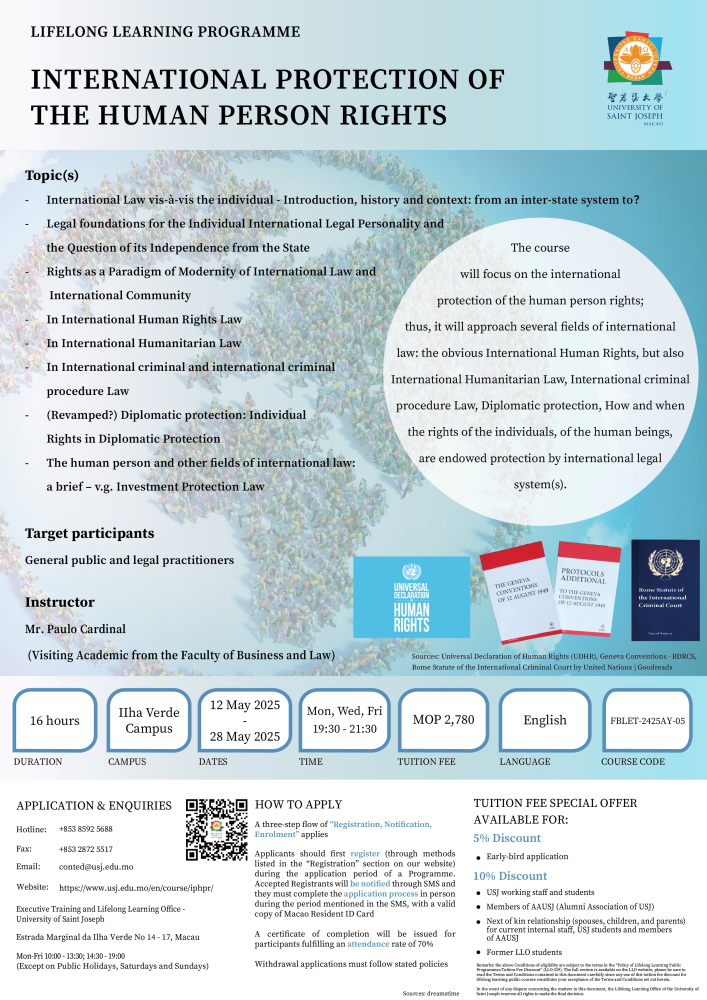International Protection of the Human Person Rights
國際人權維護
Lifelong Learning

Course Description:
Within the international community, it is a modern well-established trend – and fact – that the individual is strengthening its international capacity in a variety of domains.
The archaic concept of an international community and an international law solely reserved for the sovereign States as a sort of private exclusive club is no longer feasible, no longer adequate, no longer synchronized with reality. The concept of state sovereignty proper no longer can be described nor understood as being the same classical one brought forward by Jean Bodin and with its probable climax in the 19th century.
The individual, as usually is termed, that is, the human person, is undeniably a subject of international law, and one is not referring to the so-called sociological approaches some time ago influential in some European circles.
International Law attributes directly to the human beings’ rights, as it ascribes judicial or quasi-judicial mechanisms to defend such rights: just think of international human rights law, both universal and regional, or the protection of people such as civilians, children, medical personnel, that is the international humanitarian law; but not only.
(read more…)
However, and from «immemorial» times, international law also proscribes duties, such as in the field of international criminal law. This is another undeniable fact.
The course will focus on the international protection of the human person rights; thus, it will approach several fields of international law: the obvious International Human Rights, but also International Humanitarian Law, International criminal procedure Law, Diplomatic protection
How and when the rights of the individuals, of the human beings, are endowed protection by international legal system(s). As seen, naturally, when dealing with Human Rights. But more than that. The application of IHL, namely the Geneva bloc, fundamentally addresses the protection of individuals as its primary goal: hors combat, civilians, prisoners, wounded, medical personnel, humanitarian workers, journalists, women and children, particularly.
International Criminal Law punishes individuals, as well known, by crimes committed against other individuals (thus, reflexive protection, one may argue) such as war crimes, crimes against humanity. However, in the procedural law aspect, it does establish a number of rights and guarantees to those accused individuals.
Diplomatic protection, once considered solely as a protection of the State (of the national individual at stake) is gaining traction and more and more viewed as also another line of protection of individuals by virtue of international law rules.
Perhaps more areas or branches of international law can be called in here, either at present or at a near future.
The individual is gaining ground – and way long not merely a beachhead – in the international legal system(s) as a true subject of law and, gradually, enhancing the measure of its international law capacity and, consequentially, the international protection of the human person rights is a growing and more relevant field. These issues no longer are an exclusive domestic matter.
Study Plan / Topics:
1. International Law: a general introduction
2. Idem – International Law: character, problems and prospect
3. International relations: a brief
4. International Law vis-à-vis the individual – Introduction, history and context: from an inter-state system to?
5. International community: an introduction and perspectives of evolution especially regarding the Individual
6. Subjects of international law: notions, varied perspectives, historical evolution, prospects
(read more…)
7. The individual (human being and collective persons) and international law «today» – some general issues: v.g. rights and duties, substantive aspects and procedural issues, international individual obligations, personality versus capacity, Human Rights versus Other Rights
8. Idem: International Responsibility of the Individual
9. Idem: Legal foundations for the Individual International Legal Personality and the Question of its Independence from the State
10. Some particular areas: Protection against Acts of Violence and Forces of Nature, International Legal Status of Victims of Crime
11. Rights as a Paradigm of Modernity of International Law and International Community
12. In particular branches of Law: In International Human Rights Law
13. In International Humanitarian Law
14. In International criminal and international criminal procedure Law
15. (Revamped) Diplomatic protection: Individual Rights in Diplomatic Protection
16. Individual Rights in Consular Law
17. The human person and other fields of international law: a brief – v.g. Investment Protection Law
18. Some (possible) conclusions and prospects
Details:
| Instructor: | Mr. Paulo Cardinal |
| Duration: | 16 Hours (8 Sessions) |
| Date: | 12 May to 28 May 2025 |
| Time: | Mon, Wed, Fri 19:30 – 21:30 |
| Location: | University of Saint Joseph – IIha Verde Campus |
| Language: | English |
| Delivery of Mode: | Face-to-face Lecture |
| Tuition Fee: | MOP2,780 |
| Targeted Participants: | General public, legal practitioners, namely working at public departments involved with international law, international law practitioners, international relations experts, NGO’s personnel |
| Online Registration: | Click here |

┃5% Discount (MOP2,641)
- Early-bird application
** Applicants who submit a complete course enrollment on or before 28 April 2025 will enjoy the early-bird special offer in this course. Registrants will be notified of enrollment details via E-mail and SMS after we receive the registration. Don’t miss it!
┃10% Discount (MOP2,502)
- USJ working staff and students
- Members of AAUSJ (Alumni Association of USJ)
- Next of kin relationship (spouses, children, and parents), for current internal staff, USJ students, and members of AAUSJ
- Former LLO students
Notes: the D.S.E.D.J. 2023-2026 Continuing Education Development Subsidy Scheme is NOT available for this course.
Remarks: the above Conditions of eligibility are subject to the terms in the “Policy of Lifelong Learning Public Programmes Tuition Fee Discount” (LLO-529). The full version is available on the LLO website (click here), please be sure to read the Terms and Conditions contained in this document carefully since any use of this tuition fee discount for lifelong learning public courses constitutes your acceptance of the Terms and Conditions set out herein. In the event of any dispute concerning the matters in this document, the Lifelong Learning Office of the University of Saint Joseph reserves all rights to make the final decision.
Main Bibliography
KATE PARLETT, The Individual in the International Legal System: Continuity and Change in International Law, CUP, 2011
ANNE PETERS, Beyond Human Rights – The Legal Status of the Individual in International Law, CUP, 2016
ILIAS BANTEKAS/ LUTZ OETTE, International Human Rights Law and Practice, CUP, 2020
DINAH SHELTON, Remedies in International Human Rights Law, OUP, 2015
JENNY S. MARTINEZ, The Slave Trade and the Origins of International Human Rights Law, OUP, 2012
ANTÓNIO AUGUSTO CANÇADO TRINDADE, The Access of Individuals to International Justice, OUP, 2011
ANTÓNIO AUGUSTO CANÇADO TRINDADE, International Law for Humankind – Towards a New Jus Gentium, Brill, 2020
ROLAND PORTMANN, Legal Personality in International Law, CUP, 2010
MARTIN SCHEININ, The ICJ and the Individual, International Community Law Review 9, 2007
CHRISTIAN TOMUSCHAT, Human rights: between idealism and realism, OUP, 2009
OLIVIER DE SCHUTTER, International Human Rights Law – Cases, Materials, Commentary, CUP, 2019
WALTER KÄLIN/JÖRG KÜNZLI, The Law of International Human Rights Protection, OUP, 2019
HURST HANNUM, Rescuing Human Rights: a radically moderate approach, CUP, 2019
HURST HANNUM/S. JAMES ANAYA/DINAH L. SHELTON/ROSA CELORIO, International Human Rights: Problems of Law, Policy, and Practice, Aspen, 2023
STEVEN WHEATLEY, The Idea of International Human Rights Law, OUP, 2019
MICHELINE ISHAY, The History of Human Rights: From Ancient Times to the Globalization Era, University of California Press, 2008
WILLIAM A. SCHABAS, The Customary International Law of Human Rights, OUP, 2021
RAINER GROTE/MARIELA MORALES ANTONIAZZI/DAVIDE PARIS, Research Handbook on Compliance in International Human Rights Law, Elgar, 2021
MARCO SASSÒLI, International Humanitarian Law, Edward Elgar, 2019
NILS MELZER, International Humanitarian Law – A Comprehensive Introduction, ICRC, 2019
MARCO SASSÒLI/ ANTOINE A. BOUVIER/ANNE QUINTIN, How Does Law Protect In War?, Vol. I, Outline of International Humanitarian Law, ICRC, 2011
BEN SAUL/DAPO AKANDE, (eds), The Oxford Guide to International Humanitarian Law, OUP, 2020
WILLIAM A. SCHABAS, An Introduction to The International Criminal Court, CUP, 2011
KRIT ZEEGERS, International Criminal Tribunals and Human Rights Law – Adherence and Contextualization, Springer, 2016
KEVIN JON HELLER, FRÉDÉRIC MÉGRET, SARAH MH NOUWEN, JENS DAVID OHLIN, DARRYL ROBINSON, The Oxford Handbook of International Criminal Law, 2020
KAI AMBOS, Rome Statute of the International Criminal Court: Article-by-Article Commentary, Bloomsbury Publishing, 2022
SOPHIE RIGNEY, Fairness and Rights in International Criminal Procedure, Edinburgh, 2022
ROBERT CRYER, HAKAN FRIMAN, DARRYL ROBINSON, ELIZABETH WILMSHURST, An Introduction to International Criminal Law and Procedure, CUP, 2010
JOHN DUGARD, Diplomatic Protection and Human Rights: The Draft Articles of the International Law Commission, Australian Year Book of International Law
CHITTHARANJAN F. AMERASINGHE, Diplomatic Protection, OUP, 2008
HOW TO APPLY
A three-step flow of “Registration, Notification, Enrolment” applies.
Applicants should first register (through methods listed in the “Registration” section on our website) during the application period of a Programme. Accepted Registrants will be notified through SMS and they must complete the application process in person during the period mentioned in the SMS, with a valid copy of Macao Resident ID Card.
A certificate of completion will be issued for participants fulfilling an attendance rate of 70%.
Withdrawal applications must follow stated policies.
Remark: Programmes may be cancelled due to insufficient registration.










